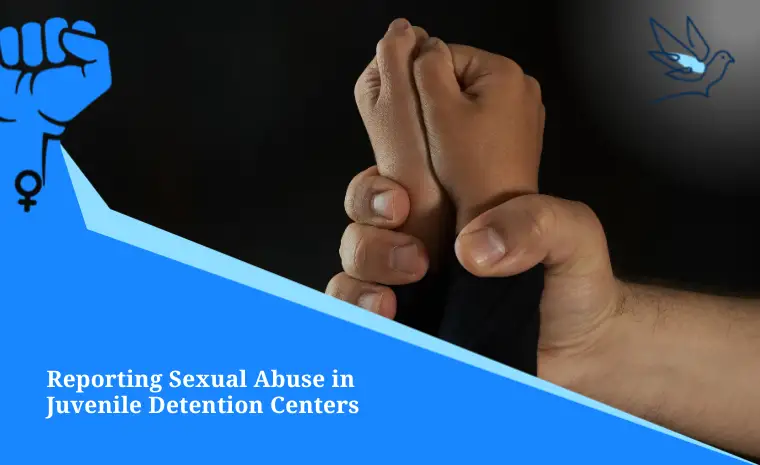Reporting sexual abuse in juvenile detention centers is a crucial step in protecting the safety and well-being of young people in custody. Sexual abuse can cause long-lasting physical and psychological harm, and it is important that victims have access to support and justice.
Prior to incarceration, a significant number of girls in juvenile detention facilities across several U.S. states experienced physical or sexual violence. This is according to a 2015 report called The Sexual Abuse to Prison Pipeline: The Girls’ Story. The report establishes a clear correlation between the involvement of girls with the juvenile justice system and their history of sexual or physical abuse.
Did you or someone you know have experienced sexual abuse in a juvenile detention center?

Who is Vulnerable to Sexual Violence
A 2012 National Survey on Youth in Custody data on behalf of the Justice Department showed the risk factors for sexual victimization among juveniles in correctional facilities.
Green Inmates
The research shows that “green” inmates, or those who are new to prison, are more susceptible to being victimized. This could be because being “green” is common among young people in custody, as they may have similar durations of detention compared to their peers.
Physical Build
Adult prisoners with a smaller physical build are more susceptible to being victimized, whereas height and weight are not associated with risk for juvenile inmates. One might assume that juveniles with a smaller build would be at greater risk of being victimized, but it is intriguing that this is not necessarily the case, given that young people develop at different rates and are placed in facilities alongside others of varying builds, which increases the likelihood of victimization.
History of Sexual and Physical Abuse
Despite differences between juveniles and adults, there are also similarities in terms of risk factors for sexual abuse while incarcerated. Both groups are more likely to be victimized if they have a history of sexual victimization in a detention facility or within their community prior to incarceration. Previous victimization increases the risk of being victimized again, as individuals may become targeted and more vulnerable due to the trauma and fear of reporting sexual abuse in California, which can discourage them from seeking help.
Gang Affiliation
While gang affiliation can often serve as a protective factor for adults against sexual assault by other inmates, it can have the opposite effect on juveniles in juvenile detention facilities. Being a member of a gang in a juvenile facility raises the likelihood of being sexually assaulted by a staff member. This type of violence may be preemptive in nature.
Sexual Orientation and Gender Identity
Research has consistently shown that individuals who identify as LGBTQ are at higher risk of sexual abuse during incarceration in correctional facilities, regardless of age. This can be attributed to prejudice, discrimination, and lack of understanding by correctional staff, as well as the hypermasculine culture that often exists in these environments. LGBTQ individuals may be targeted for harassment by both staff and other inmates due to their sexual orientation or gender identity.
Race, Color, and Stereotypes
Studies have shown that youth of color are disproportionately represented in the juvenile justice system and are at higher risk of sexual abuse in detention centers. This vulnerability is linked to systemic racism and discrimination in the criminal justice system.
Youth of color are more likely to come from disadvantaged backgrounds and experience poverty, family dysfunction, and community violence, making them more vulnerable to sexual abuse. Moreover, racial biases and stereotypes can lead to harsher treatment and punishment, which can exacerbate their vulnerability to sexual abuse.
Addressing racial disparities and systemic racism in the criminal justice system is crucial to preventing sexual abuse of youth of color in detention centers.
How To Report Sexual Misconduct in Juvenile Facilities
According to the Youth Workers’ Handbook on Identifying and Addressing Sexual Violence in Juvenile Justice Settings by the National Institute of Corrections, early detection and reporting of sexual misconduct is vital in all juvenile facilities.
Identifying The Warning Signs
To address and prevent sexual abuse of youth, it is important to focus on the behaviors of both staff and youth, as well as the actions of managers in charge. One approach that has been used is to identify “red flags” for youth, which can serve as warnings or demands for attention.
These warning signs can include certain actions, words, situations, or practices that may indicate danger or risk of sexual abuse. By paying attention to these red flags and assessing both their own behaviors and those of others, staff, youth, and managers can work together to create a safer environment and prevent sexual abuse from occurring.
To identify staff sexual misconduct, it is important to watch out for certain warning signs or red flags, such as:
- Staff showing an excessive attachment to specific youth or their problems.
- A youth having personal knowledge about a staff member.
- Conversations between staff and youth that have a sexual nature or that refer to the physical characteristics of staff or a resident.
- A youth being present in unauthorized areas or repeatedly leaving assigned spaces.
- Staff spending an unexplained amount of time with youth.
- A youth has letters or pictures from staff members.
- Staff members granting special requests or showing favoritism.
Report The Abuse Immediately
Tell a trusted staff member or the probation officer at the youth detention facility of the situation immediately. Staff members are required to report any allegations of sexual abuse to their supervisors, and the appropriate authorities will be notified. It is important to document any reports or complaints made to staff members and keep a record of any responses or actions taken.
The National Sexual Assault Hotline 1-800-656-HOPE (4673) is also available for victims to receive confidential support and assistance.
In addition, every state has a designated agency or hotline for reporting violence or neglect of children. These agencies are required to investigate allegations of abuse and take appropriate action to protect the victim. In California, you may seek help from the California Civil Rights Department at (800) 884-1684.
Seek Medical Attention
It is also important to have access to health care after experiencing sexual abuse. A medical examination can provide important evidence and help identify any injuries or illnesses resulting from the abuse.
The staff responsible should also understand state laws regarding minors’ consent to medical treatment. Depending on the state, a minor may be able to consent to a SANE (sexual assault nurse examiner) exam or require parental or guardian consent. In certain situations, a police officer, child protective services representative, or court may consent to the exam in order to collect time-sensitive evidence.
Even if the 96-hour window for evidence collection has passed, a youth who has reported sexual assault should still receive medical attention, including a physical exam and treatment for any injuries or long-term medical conditions resulting from the abuse.
In addition to a basic health examination and treatment, it is important to seek counseling and support services to help cope with the emotional trauma of sexual abuse. Many organizations provide free and confidential counseling services to victims of sexual abuse, and it is important to connect with mental health services to receive the care and support needed.
Consult with A Lawyer
It is also important to understand the legal rights and options available to victims of sexual abuse in juvenile detention centers. Victims may be able to pursue legal action against their abusers and the facility, and it is important to consult with a sexual abuse lawyer with experience in this area of sexual and physical violence.
Be An Advocate
Finally, support systemic changes that can help prevent sexual abuse in juvenile detention centers. This may include advocating for increased staff training, improved reporting and investigation procedures, and increased accountability for abusers.
Advocates and organizations can play a critical role in supporting victims of sexual abuse in juvenile camps. They can provide information and guidance on reporting procedures, connect victims with legal and counseling services, and work to promote systemic changes that can help prevent future abuse. It is important to seek out these resources and encourage others to do the same.
Ways to Prevent Incidents of Abuse in Juvenile Centers
To ensure the safety and well-being of juvenile inmates, it is essential to implement effective prevention strategies that address the root causes of abuse and empower staff and youth to take action, preventing the occurrence of such crimes.
- Observe zero tolerance for youth sexual abuse.
- Report all incidents of sexual abuse in your agency.
- Take all allegations of abuse seriously, whether reported by staff or youth, and investigate them.
- Implement and adhere to the Prison Rape Elimination Act (PREA) juvenile standards.
- Provide appropriate supervision for the youth in your care.
- Utilize available resources for assistance such as the Office of Juvenile Justice and Delinquency Prevention, Bureau of Justice Assistance, and the National Institute of Corrections.
- Regularly review and revise PREA-related policies.
- Train staff and youth on preventing and addressing sexual abuse.
Speak Up, Report, and Protect The Youth
Reporting sexual abuse in a juvenile detention center is a difficult but essential step in protecting the safety and well-being of young people in custody. By speaking out, seeking support, and advocating for change, victims can help prevent future abuse and promote a more just and humane system for all.
Need Help? Call the Women’s Rights Group now.
Are you or anyone you know a victim of sexual violence in a juvenile facility?
Our attorneys at the Women’s Rights Group in California will stand by you in the fight against sexual abuse and get you the compensation and justice you rightfully deserve. We provide free consultations with qualified lawyers who assure privacy and confidentiality in all communications related to this delicate issue.
Get in touch with us today for a confidential case review without any obligation.






